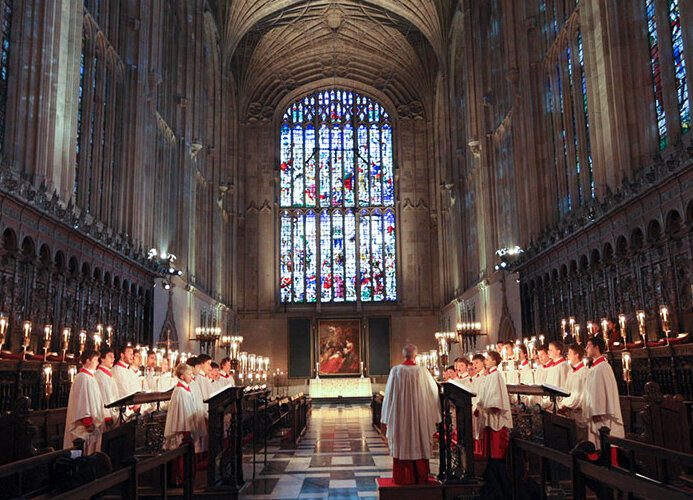
For a certain kind of Christmas music lover (tmatt raises his hand high) there are few words richer and more emotional than, “Once in royal David’s city, stood a lowly cattle shed. …”
The former choirboy in me — yes, there are fine choirs in some corners of Texas — has always tried to imagine the pressure on the boy soprano chosen to sing those words at the start of the annual Festival of Nine Lessons and Carols in the gothic chapel at King’s College, Cambridge.
Whatever the word “tradition” means in Anglicanism these days, tuning into the live radio broadcast of this rite is an example of something sacred that still plays an important role in British life. I mean, everyone is listening — including the Queen.
But in 2020 … And what about that mutant variation on COVID-19 … Isn’t choral music really dangerous? … Of course the chapel is empty … Are there masks that match robes worn by the choristers? Etc., etc.
I’m happy to report that several news organizations thought ahead and wrote stories about the Christmas Eve challenges of COVID-tide, including The New York Times: “A Choir Tries to Keep Its Christmas Tradition Alive.”
The story starts exactly how you would imagine that it would start — with a rehearsal as the choir prepared for the ritual that everyone is hoping will be allowed to proceed:
CAMBRIDGE, England — On a recent evening, the 16 boys and 14 men of the Choir of King’s College, Cambridge, stood in the gothic chapel where they perform, spread out in the flickering candlelight.
A few of the choristers gazed at the vaulted ceiling about 80 feet above them. Then Daniel Hyde, the choir’s music director, signaled that he was ready to begin, and all slipped off the masks they had been wearing to sing “I Saw Three Ships,” a sprightly carol that will be heard by about 100 million people. …
Each Christmas Eve, the choir’s “Festival of Nine Lessons and Carols” is broadcast live on radio stations worldwide, including about 450 in the United States.
What are the stakes here?
In a typical year, the choir performs in religious services in the college chapel several times a week and tours worldwide. It has sung the Christmas Eve carol service every year since 1918, and the event has become a cherished holiday tradition.
The choir continued singing “I Saw Three Ships” for about 15 minutes, pausing now and again so Mr. Hyde could give feedback and fine-tune the sound. Although it seemed like an ordinary choir rehearsal, there was more at stake. Microphones in the chapel were ready to record everything in case a coronavirus outbreak — or another government lockdown, as has since been introduced in London and most of England’s southeast — stopped them from singing live on Christmas Eve.
As you would expect, the Times team does a great job explaining why choral music rehearsals and performances are high-risk environments, when it comes to spreading a virus via deep breathing and producing musical notes that soar into an open vault.
The music is challenging enough, as it is. The story notes that social distancing — bubbles of singers six feet apart — changed the acoustics enough to affect timing.
Sure enough, two of the adult singers assisting the choir tested positive earlier this week. The six-member male ensemble known as The King’s Singers were added, on very short notice.
Alas, the wrong kind of history will be made in 2020. Jumping back to that earlier rehearsal:
When the last chord ended, the singers’ voices reverberated beautifully around the chapel: a perfect Christmas sound, with no audience to hear it.
“Good,” Mr. Hyde said. “Let’s take a break.”
Later, he said he thought the recording had been successful, but he hoped it would never be heard, because the choir would perform live on Christmas Eve instead. “Let’s hope we can just keep it in a drawer,” he said.
He didn’t get his wish. On Dec. 18, with coronavirus cases soaring in Britain and rumors circulating that a new lockdown was imminent, the choir canceled the live broadcast. It decided it just couldn’t risk going ahead and contributing to the growth of the pandemic.
This year, listeners around the world on Christmas Eve will hear the December recording instead.
It’s a fine story and a good story.
But something is missing. Want to guess what that would be?
Other than the titles of a few pieces of music — which certainly sound Christian in nature — the story doesn’t include even a sentence about the content of the service or what it means. This ritual, for millions, is the crucial moment that signals that Christmas is truly here, but that seems to have nothing to do with the Bible “lessons” or the Christmas “carols” that make up this worship service.
So I will ask: Is this a mass-media phenomenon or is an Anglican worship service?
If there is any chance that the answer, for many people, is “BOTH,” maybe it would have been good to have included a few sentences of the lovely sacred texts that make up this rite linked to the Nativity of Our Lord and Savior Jesus Christ (to get a bit liturgical, in terms of the name of this holy day)?
Just asking. Just a few sentences. Please? The contents of this service may have something to do with, well, the meaning of this service.










